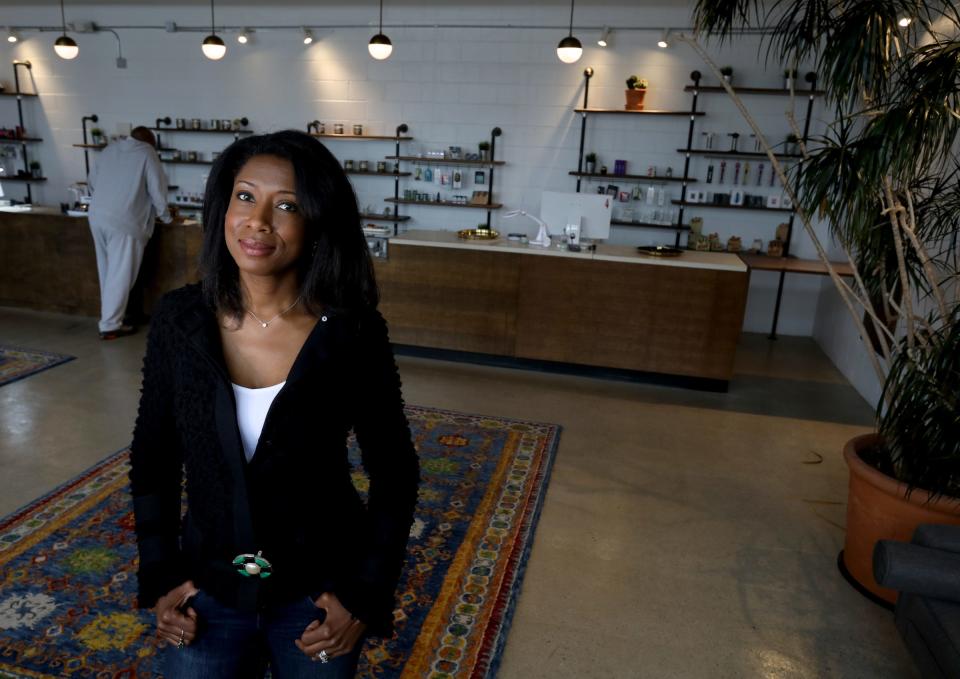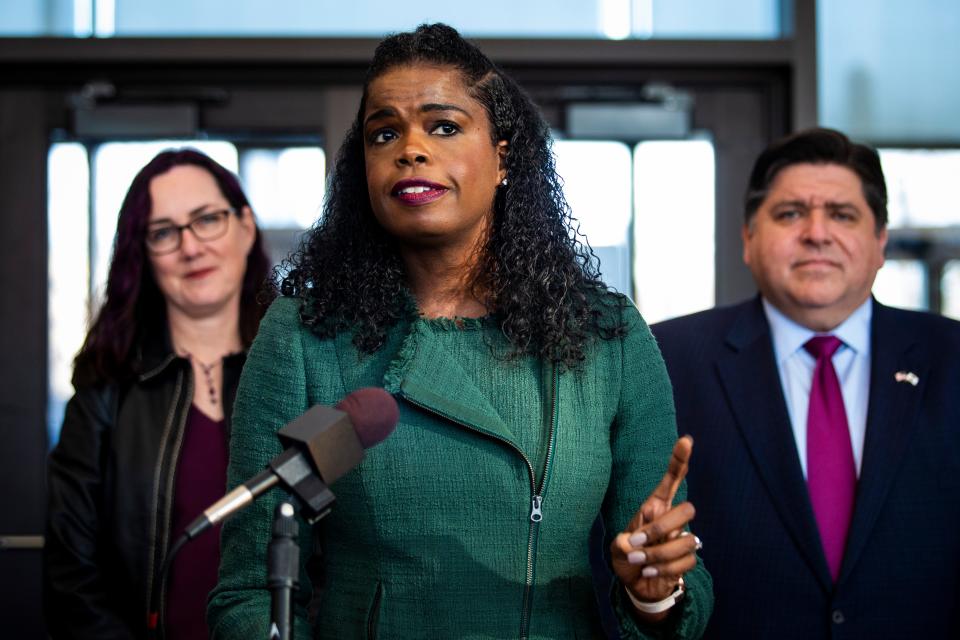Illinois wants to get rolling on weed sales, but some say only white men are set to profit
CHICAGO — Illinois is about to become the 11th state in the nation to allow the sale of recreational marijuana. But when the floodgates open in Chicago on New Year's Day, it'll be white men raking in the profits, aldermen say.
In Chicago, where 11 dispensaries have been licensed thus far, not one is owned by a woman or person of color, aldermen say.
That's because the city's initial licenses are only being awarded to owners of existing medical cannabis dispensaries, which have little-to-no minority ownership.
"No African Americans, no Latinx, no women," Ald. Jason Ervin said at a contentious hourslong City Council meeting Wednesday. "A billion dollar industry is about to pass us by."
While the Illinois cannabis law lays out a "social equity plan" to improve diversity in the industry, some say that giving initial licenses to existing dispensary owners stacks the decks against future owners, who will be behind by the time they're up and running this spring.
"It seems, historically, that we are never in the lead. We’re always told to wait our turn," Ald. Leslie Hairston said. "The only people that benefit from this deal are the white people. Once again, we get thrown in the jails, and they get thrown in the banks."
Recreational marijuana: What to know about legal in Michigan and Illinois
The marijuana industry in Illinois could eventually bring in $1.69 billion to $2.58 billion in annual revenue, according to a study by Colorado consulting firm Freedman and Koski. That would mean an additional $440 million to $676 million in annual tax revenue statewide, the study said.
Chicago, which is facing a more than $800 million budget deficit, expects to bring in $3.5 million in revenue from marijuana taxes next year.
Last month, a lottery to determine which dispensaries would gain the right to sell recreational marijuana in Chicago attracted scrutiny when a photo posted to social media appeared to show a group of white men gathered in the room.
This picture is telling a whoooole story https://t.co/JpSfW65tfI
— Antonia Hylton (@ahylton26) November 15, 2019
That same afternoon, Mayor Lori Lightfoot said on Twitter that she was "not satisfied with the current state of equity in the cannabis industry."
"It's no secret. ... There isn’t a single medical operator today that is majority minority," said Ron Holmes, a Chicago native who negotiated for legalization in Illinois on behalf of the cannabis industry. "Illinois follows a very dangerous trend in legalized cannabis in not having diversity."
Minorities are still underrepresented in cannabis industries nationwide. About 81% of marijuana business owners and founders identified as white in a 2017 survey by Marijuana Business Daily. A more recent survey found that just 1.2% of recreational marijuana businesses in Massachusetts are owned by minorities, compared to 16.4% in Ohio's medical market.
On Tuesday, members of Chicago's Black Caucus put forward an ordinance to delay the sale of recreational marijuana by six months, at which point they expect some minority-owned dispensaries would also be licensed.
"We certainly are not going to stand by and let those who have borne the brunt of the war on drugs get victimized twice as white and corporate interests reap the profits," Ald. Anthony Beale said. "This product has hurt communities of color for decades. People have been disproportionately arrested, convicted and incarcerated because of this industry."
The motion was voted down Wednesday following a lengthy back-and-forth in City Council, with some aldermen saying it was too little too late.
"This is not a perfect bill, but it’s a start. ... We have got to work our way up, incrementally," said Ald. Gilbert Villegas. "(Let's) move forward, get this industry rolling — no pun intended."
Is marijuana linked to psychosis or schizophrenia? It's contentious, but doctors and feds say yes

What is Illinois doing to promote social equity in the cannabis industry?
Illinois' cannabis law takes an equity approach that the state says will give a leg up to minority entrepreneurs disproportionately impacted by poverty and the war on drugs.
There are similar programs in the recreational markets of California, Massachusetts and Michigan, as well as medical markets in Maryland, Ohio and Pennsylvania.
"For the past five years, Illinois has had a homogeneous cannabis industry, and it takes a tremendous amount of effort and diligence to turn it around in a constitutional way. The cannabis law does just that," said Toi Hutchinson, senior adviser to Gov. J.B. Pritzker.
The law sets up a "social equity applicant status" that provides would-be minority dispensary owners with technical assistance in preparing their license applications, awards additional points on their overall license application score, and reduces license and application fees. It also creates a loan fund that will provide applicants with $30 million in seed funding, and it sets aside 25% of cannabis revenue for programs in disadvantaged communities, Hutchinson said.
The law also expunges certain drug-based criminal records.
Last week, State’s Attorney Kim Foxx expunged low level criminal records of 1,000 people in Cook County, and hundreds of thousands more are expected to be expunged, Hutchinson said.
"This is the most innovative approach in the nation, and it stands out the core of our objective to deliver long-term, sustainable equity at every level of the cannabis market," Pritzker said at a press conference earlier this month.
Teen marijuana vaping: It's on the rise, a new report says, and it's threatening to 'undo years of progress'

So far, 32 of the state's 55 medical cannabis dispensaries are licensed to begin recreational sales Jan. 1.
Last week, the state began accepting applications for new dispensary licenses. Pritzker says regulators are expected to award 75 more licenses for new dispensaries by May 1, plus another 110 by December 2021. Eventually, Illinois plans to have 500 dispensaries.
For Holmes, the social equity program is a chance to "put color in the cannabis industry." Holmes co-runs a consulting hub, the Majority-Minority Group, that helps minority applicants apply for a dispensary license.
"Our goal is, by the time that this application window concludes, the state won’t have an excuse that there weren’t capable, vetted entities that applied," Holmes said. "For me, this isn’t necessarily about cannabis. It’s about how you build an economy that works for everyone, especially those that have been disproportionately impacted the most."
Le'Qoinne Rice, 38, is applying with three partners as a social equity applicant. He grew up in Waukegan, Illinois, an area designated by the state as "disproportionately impacted" by the war on drugs. Rice and two of his partners now live in Chicago in neighborhoods with the same designation.
"I believe this is reparations for brown and black people. It’s also real estate that we can set forth for our children and our children’s children," Rice said. "If we are awarded a license, our goal is to help other people get licenses. We just want to be that glimmer of hope that it can be done."
Who can legally buy weed in Illinois?
Anyone over 21 with a valid state ID or driver's license can purchase recreational marijuana from licensed retailers starting Jan. 1.
Residents will be able to have up to 30 grams of cannabis flower, 5 grams of concentrate and 500 milligrams of THC in products such as edibles. Non-Illinois residents in the state may possess up to only half as much as residents.
It's illegal to drive while impaired and to possess marijuana on federal land and federally funded facilities, including some hospitals, public housing and more.
Crack vs. heroin: Unfair system arrested millions of blacks, urged compassion for whites
This article originally appeared on USA TODAY: Illinois marijuana: Chicago weed dispensary owners aren't diverse

